新概念英语第二册课后习题答案及解释
新概念英语第二册1-20课后答案详解
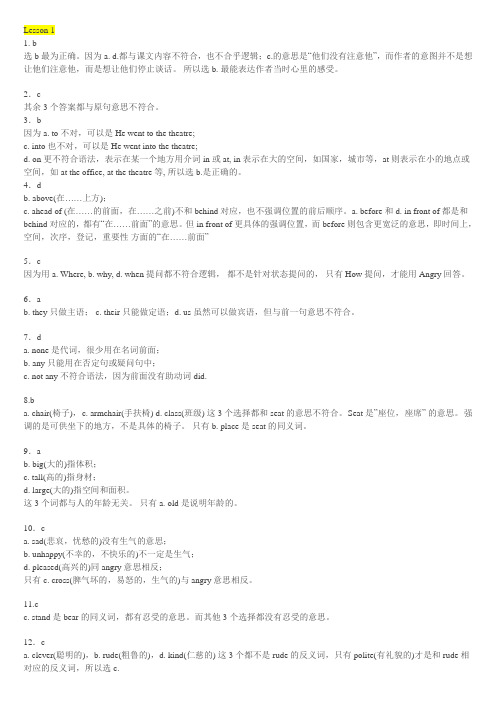
Lesson 11. b选b最为正确。
因为a. d.都与课文内容不符合,也不合乎逻辑;c.的意思是“他们没有注意他”,而作者的意图并不是想让他们注意他,而是想让他们停止谈话。
所以选b. 最能表达作者当时心里的感受。
2.c其余3个答案都与原句意思不符合。
3.b因为a. to 不对,可以是He went to the theatre;c. into 也不对,可以是He went into the theatre;d. on更不符合语法,表示在某一个地方用介词in 或at, in 表示在大的空间,如国家,城市等,at 则表示在小的地点或空间,如at the office, at the theatre 等, 所以选b.是正确的。
4.db. above(在……上方);c. ahead of (在……的前面,在……之前)不和behind 对应,也不强调位置的前后顺序。
a. before 和d. in front of 都是和behind对应的,都有“在……前面”的意思。
但in front of 更具体的强调位置,而before 则包含更宽泛的意思,即时间上,空间,次序,登记,重要性方面的“在……前面”5.c因为用 a. Where, b. why, d. when 提问都不符合逻辑,都不是针对状态提问的,只有How提问,才能用Angry回答。
6.ab. they 只做主语;c. their只能做定语;d. us 虽然可以做宾语,但与前一句意思不符合。
7.da. none是代词,很少用在名词前面;b. any 只能用在否定句或疑问句中;c. not any 不符合语法,因为前面没有助动词did.8.ba. chair(椅子), c. armchair(手扶椅) d. class(班级) 这3个选择都和seat的意思不符合。
Seat 是”座位,座席”的意思。
强调的是可供坐下的地方,不是具体的椅子。
只有b. place 是seat 的同义词。
新概念英语第二册课后习题答案详解(整理打印版)
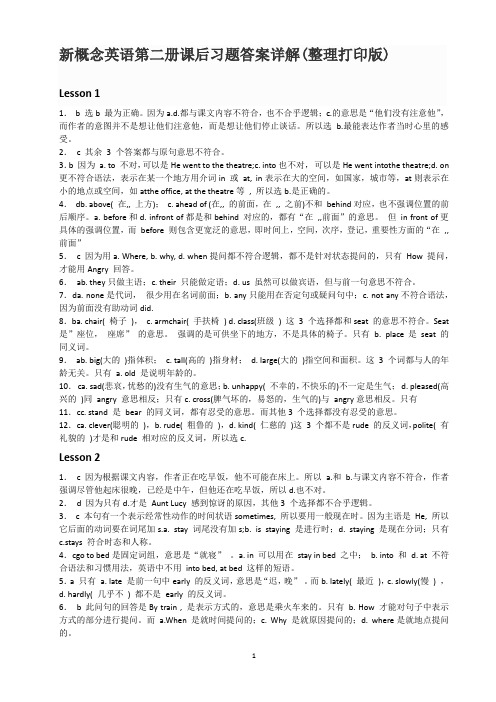
新概念英语第二册课后习题答案详解(整理打印版)Lesson 11.b 选b 最为正确。
因为a.d.都与课文内容不符合,也不合乎逻辑;c.的意思是“他们没有注意他”,而作者的意图并不是想让他们注意他,而是想让他们停止谈话。
所以选 b.最能表达作者当时心里的感受。
2.c 其余3 个答案都与原句意思不符合。
3.b 因为a. to 不对,可以是He went to the theatre;c. into也不对,可以是He went intothe theatre;d. on 更不符合语法,表示在某一个地方用介词in 或at, in表示在大的空间,如国家,城市等,at则表示在小的地点或空间,如atthe office, at the theatre等, 所以选b.是正确的。
4.db. above( 在,, 上方);c. ahead of (在,, 的前面,在,, 之前)不和behind对应,也不强调位置的前后顺序。
a. before和d. infront of都是和behind 对应的,都有“在,,前面”的意思。
但in front of更具体的强调位置,而before 则包含更宽泛的意思,即时间上,空间,次序,登记,重要性方面的“在,, 前面”5.c 因为用a. Where, b. why, d. when提问都不符合逻辑,都不是针对状态提问的,只有How 提问,才能用Angry 回答。
6.ab. they只做主语;c. their 只能做定语;d. us 虽然可以做宾语,但与前一句意思不符合。
7.da. none是代词,很少用在名词前面;b. any只能用在否定句或疑问句中;c. not any不符合语法,因为前面没有助动词did.8.ba. chair( 椅子),c. armchair( 手扶椅) d. class(班级) 这3 个选择都和seat 的意思不符合。
Seat 是”座位,座席”的意思。
强调的是可供坐下的地方,不是具体的椅子。
(完整word)新概念英语第二册课后答案(全部) 超级详细的哦!!

•新概念英语第二册课后答案Lesson11.b选b最为正确。
因为a。
d.都与课文内容不符合,也不合乎逻辑;c。
的意思是“他们没有注意他”,而作者的意图并不是想让他们注意他,而是想让他们停止谈话。
所以选b.最能表达作者当时心里的感受.2.c其余3个答案都与原句意思不符合。
3.b因为a。
to不对,可以是Hewenttothetheatre;c。
into也不对,可以是Hewentintothetheatre;d.on更不符合语法,表示在某一个地方用介词in或at,in表示在大的空间,如国家,城市等,at则表示在小的地点或空间,如attheoffice,atthetheatre等,所以选b.是正确的。
4.db。
above(在……上方);c。
aheadof(在……的前面,在……之前)不和behind对应,也不强调位置的前后顺序.a。
before和d。
infrontof都是和behind对应的,都有“在……前面”的意思.但infrontof更具体的强调位置,而before则包含更宽泛的意思,即时间上,空间,次序,登记,重要性方面的“在……前面”5.c因为用a。
Where,b.why,d.when提问都不符合逻辑,都不是针对状态提问的,只有How提问,才能用Angry回答。
6.ab。
they只做主语;c。
their只能做定语;虽然可以做宾语,但与前一句意思不符合.7.da。
none是代词,很少用在名词前面;b.any只能用在否定句或疑问句中;c.notany不符合语法,因为前面没有助动词did.8.ba。
chair(椅子),c。
armchair(手扶椅)d.class(班级)这3个选择都和seat的意思不符合。
Seat是”座位,座席”的意思。
强调的是可供坐下的地方,不是具体的椅子。
只有b。
place是seat的同义词。
9.ab。
big(大的)指体积;c.tall(高的)指身材;d。
large(大的)指空间和面积。
新概念英语第二册课后习题答案

新概念英语第二册课后习题答案新概念英语第二册课后习题答案(精选8篇)新概念英语作为一套世界闻名的英语教程,以其全新的教学理念,有趣的课文内容和全面的技能训练,深受广大英语学习者的欢迎和喜爱。
为了方便同学们的学习,店铺为大家整理了新概念英语第二册课后习题答案,希望为大家的新概念英语学习提供帮助!新概念英语第二册课后习题答案篇11. b根据课文第2-3行I have been trying to get my new room in order. This has not been easy because I own over a thousand books 可以看出只有b. he is finding it difficult to get his room in order 与课文的实际情况相符,其他3个选择都不符合故事所描述的情景。
2. c根据课文第9-10行‘This is the prettiest carpet I have ever seen,’ she said, 可以判断出只有c. the books make a nice carpet 是作者的妹妹的真实想法,其他3个选择都与课文的内容不符,也不是他妹妹所认为的。
3. c只有c. is still working 是正确的,因为前半句用的是现在完成进行时,表示到现在为止动作还在继续进行,所以后半句应该用现在进行时,才能使句子的时态协调一致。
其他3个选择都不能与前半句的时态相配。
4. aa. make it tidy (把它收拾整齐);b. keep it tidy (保持整洁);c. make order 不合乎习惯用法,意思也讲不通;d. keep order (维持秩序)。
只有a. 最符合题目意思,因为make it tidy 与前一句中的get his room in order 意思相同,所以选a.5. ba. a small enough 不合乎语法,不能说a small enough room,可以是 the room is small enough.b. a fairly small(相当小的),c. a terribly small(极小的),d. a much smaller(更加小的),4个选择中只有b 是正确的,因为b中的fairly 同前一句的rather(相当)意义相同,所以b是对的。
新概念英语第二册课后习题答案全

新概念英语第二册课后习题答案全一、练习册第1课至第10课课后习题答案1. Lesson 1: A Private ConversationAnswer Key:1. Yes, he did.2. He asked the woman to change her seat.3. She replied that she was in the middle.2. Lesson 2: Breakfast or Lunch?Answer Key:1. He wanted to buy a newspaper.2. He ordered breakfast.3. He thought it was too early for lunch.3. Lesson 3: Please Send Me a CardAnswer Key:1. He was in a small village.2. He sent a telegram to his wife.3. He was in a hospital.4. Lesson 4: An Exciting TripAnswer Key:1. They were in a bus.2. They were going to a village.3. They had a wonderful trip.5. Lesson 5: No Wrong Numbers1. He was waiting for a phone call.2. He was waiting for his uncle.3. He received a wrong number.6. Lesson 6: Percy ButtonsAnswer Key:1. He was an old man.2. He collected old coins.3. He had a valuable coin.7. Lesson 7: Too LateAnswer Key:1. They were late for the meeting.2. They missed the train.3. They had to take a taxi.8. Lesson 8: The Best and the WorstAnswer Key:1. He was a good swimmer.2. He was the best swimmer in the pool.3. He was the worst swimmer in the pool. Answer Key:1. He was a famous actor.2. He was in a small town.3. He was recognized a young man.10. Lesson 10: Not for Jazz1. He was a famous musician.2. He played the piano.3. He was not for jazz.二、练习册第11课至第20课课后习题答案11. Lesson 11: One Good Turn Deserves Another Answer Key:1. He helped an old lady.2. She helped him find his way.3. He was grateful to her.12. Lesson 12: Ask Me No QuestionsAnswer Key:1. He was a writer.2. He wrote a book about his adventures.3. He was very modest.13. Lesson 13: Going on HolidayAnswer Key:1. They were going on holiday.2. They were going to the seaside.3. They had a wonderful time.14. Lesson 14: Do You Speak English?Answer Key:1. He was a tourist.2. He was in a foreign country.3. He spoke English.15. Lesson 15: Good NewsAnswer Key:1. He was a doctor.2. He had good news for his patient.3. The patient was cured.16. Lesson 16: A Polite RequestAnswer Key:1. He was a customer.2. He wanted to buy a new car.3. He asked the salesman for help.17. Lesson 17: Across the ChannelAnswer Key:1. He was a swimmer.2. He swam across the English Channel.3. He was very tired.18. Lesson 18: Once a WeekAnswer Key:1. He was a doctor.2. He visited his patients once a week.3. He was very busy.19. Lesson 19: Sold OutAnswer Key:1. He was a customer.2. He wanted to buy a ticket.3. The ticket was sold out.20. Lesson 20: One Man in a BoatAnswer Key:1. He was a fisherman.2. He was alone in a boat.3. He caught a lot of fish.。
新概念英语第二册课后习题答案详解
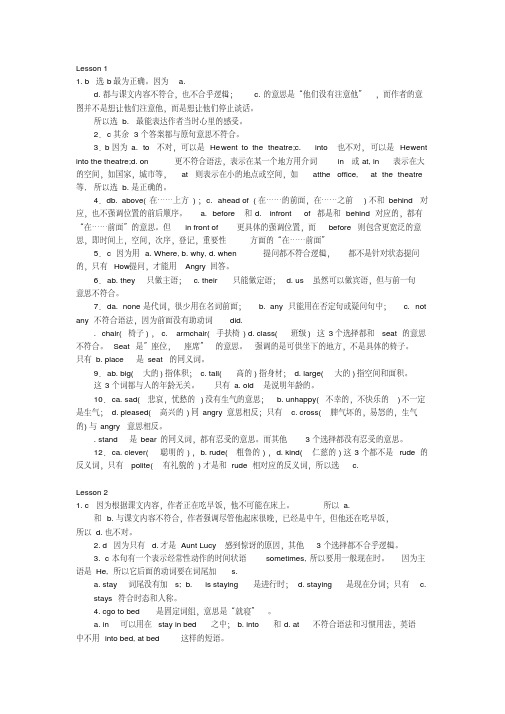
Lesson 11. b选b最为正确。
因为 a.d.都与课文内容不符合,也不合乎逻辑; c.的意思是“他们没有注意他”,而作者的意图并不是想让他们注意他,而是想让他们停止谈话。
所以选 b. 最能表达作者当时心里的感受。
2.c其余3个答案都与原句意思不符合。
3.b因为a. to 不对,可以是He went to the theatre;c. into 也不对,可以是He w ent into the theatre;d. on更不符合语法,表示在某一个地方用介词in 或at, in 表示在大的空间,如国家,城市等,at 则表示在小的地点或空间,如atthe office, at the theatre 等, 所以选 b.是正确的。
4.db. above(在……上方);c. ahead of (在……的前面,在……之前)不和behind 对应,也不强调位置的前后顺序。
a. before 和 d. infront of 都是和behind对应的,都有“在……前面”的意思。
但in front of 更具体的强调位置,而before则包含更宽泛的意思,即时间上,空间,次序,登记,重要性方面的“在……前面”5.c因为用 a. Where, b. why, d. when 提问都不符合逻辑,都不是针对状态提问的,只有How提问,才能用Angry回答。
6.ab. they 只做主语; c. their只能做定语; d. us 虽然可以做宾语,但与前一句意思不符合。
7.da. none是代词,很少用在名词前面; b. any 只能用在否定句或疑问句中; c. not any 不符合语法,因为前面没有助动词did.. chair(椅子), c. armchair(手扶椅) d. class(班级) 这3个选择都和seat的意思不符合。
Seat是”座位,座席”的意思。
强调的是可供坐下的地方,不是具体的椅子。
只有b. place 是seat 的同义词。
新概念英语第二册课后习题答案详解_1-10
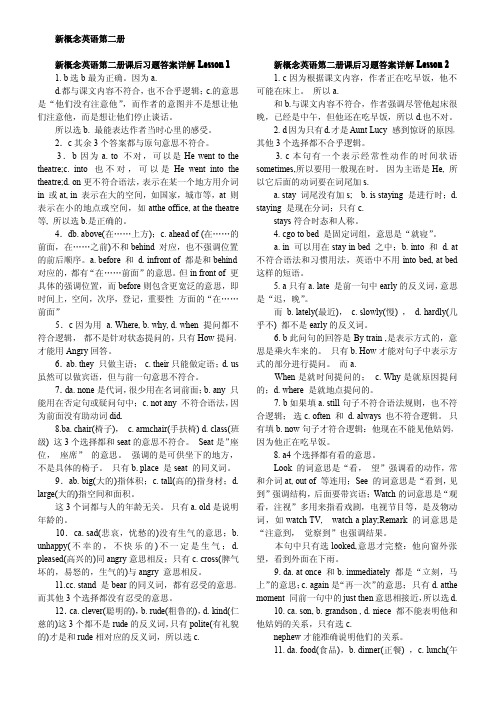
新概念英语第二册新概念英语第二册课后习题答案详解Lesson11.b选b最为正确。
因为a.d.都与课文内容不符合,也不合乎逻辑;c.的意思是“他们没有注意他”,而作者的意图并不是想让他们注意他,而是想让他们停止谈话。
所以选b.最能表达作者当时心里的感受。
2.c其余3个答案都与原句意思不符合。
3.b因为a.to不对,可以是He went to the theatre;c.into也不对,可以是He went into the theatre;d.on更不符合语法,表示在某一个地方用介词in或at,in表示在大的空间,如国家,城市等,at则表示在小的地点或空间,如atthe office,at the theatre 等,所以选b.是正确的。
4.db.above(在……上方);c.ahead of(在……的前面,在……之前)不和behind对应,也不强调位置的前后顺序。
a.before和 d.infront of都是和behind 对应的,都有“在……前面”的意思。
但in front of更具体的强调位置,而before则包含更宽泛的意思,即时间上,空间,次序,登记,重要性方面的“在……前面”5.c因为用 a.Where,b.why,d.when提问都不符合逻辑,都不是针对状态提问的,只有How提问,才能用Angry回答。
6.ab.they只做主语;c.their只能做定语; 虽然可以做宾语,但与前一句意思不符合。
7.da.none是代词,很少用在名词前面;b.any只能用在否定句或疑问句中;c.not any不符合语法,因为前面没有助动词did.8.ba.chair(椅子),c.armchair(手扶椅)d.class(班级)这3个选择都和seat的意思不符合。
Seat是”座位,座席”的意思。
强调的是可供坐下的地方,不是具体的椅子。
只有b.place是seat的同义词。
9.ab.big(大的)指体积;c.tall(高的)指身材;d. large(大的)指空间和面积。
新概念英语第二册课后答案

新概念英语第二册课后答案篇一: 新概念英语第二册课后练习lesson14新概念英语第二册课后习题答案详解Lesson 14练习答案Key to written exercises1. 关键句型练习答案A 1 I drove on to the next town after I had left a small village.2 I said good morning to him in French as soon as he had got into the car.3 I had nearly reached the town, when the young man said:‘Do you speak English?’C 1 After she had written the letter, she went to the post office.2 After he had had dinner, he went to the cinema.3 When I had fastened my seat belt, the plane took off.4 We did not disturb him until he had finished work.5 As soon as he had left the room, I turned on the radio.6 He had been very ill before he died.D 1 regretted2 had begun/ began3 arrived2. 难点练习答案1 Except for2 both of3 Apart from4 asked…ask for5 neither of…asked3. 多项选择题答案1.b按照课文第3行.stoppe.an.h.aske.m.fo..lift.只有b.h.wante..freerid.i.th.ca.最符合课文内容,而其他3个选择都与课文内容不符合。
新概念英语第二册全册课后习题答案详解及单元测试答案
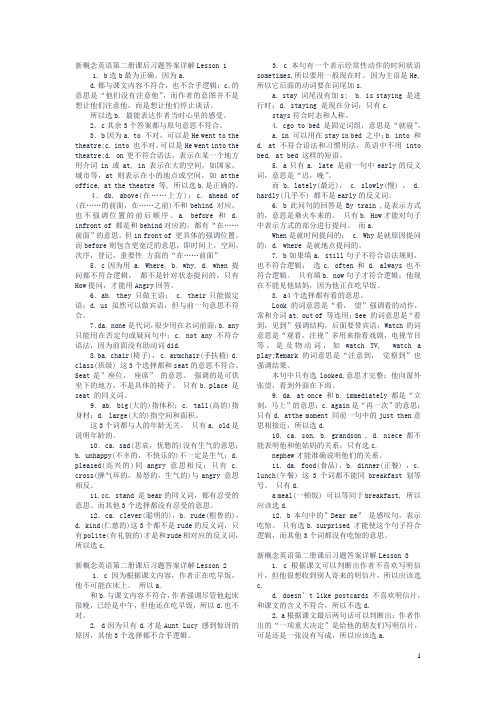
新概念英语第二册课后习题答案详解Lesson 11. b选b最为正确。
因为a.d.都与课文内容不符合,也不合乎逻辑;c.的意思是“他们没有注意他”,而作者的意图并不是想让他们注意他,而是想让他们停止谈话。
所以选b. 最能表达作者当时心里的感受。
2.c其余3个答案都与原句意思不符合。
3.b因为a. to 不对,可以是He went to the theatre;c. into 也不对,可以是He went into the theatre;d. on更不符合语法,表示在某一个地方用介词in 或at, in 表示在大的空间,如国家,城市等,at 则表示在小的地点或空间,如atthe office, at the theatre 等, 所以选b.是正确的。
4.db. above(在……上方);c. ahead of (在……的前面,在……之前)不和behind 对应,也不强调位置的前后顺序。
a. before 和 d. infront of 都是和behind对应的,都有“在……前面”的意思。
但in front of 更具体的强调位置,而before则包含更宽泛的意思,即时间上,空间,次序,登记,重要性方面的“在……前面”5.c因为用 a. Where, b. why, d. when 提问都不符合逻辑,都不是针对状态提问的,只有How提问,才能用Angry回答。
6.ab. they 只做主语; c. their只能做定语;d. us 虽然可以做宾语,但与前一句意思不符合。
7.da. none是代词,很少用在名词前面;b. any 只能用在否定句或疑问句中;c. not any 不符合语法,因为前面没有助动词did.8.ba. chair(椅子), c. armchair(手扶椅) d. class(班级) 这3个选择都和seat的意思不符合。
Seat是”座位,座席”的意思。
强调的是可供坐下的地方,不是具体的椅子。
新概念英语第二册课后习题答案详解_1-10

新概念英语第二册课后习题答案详解Lesson 61. d根据课文第2-3行In return for this , the beggar stood on his head…, 只有d. hewanted to ‘pay’for his meal in this way,才能准确表达他这样做的原因,而其他3个选择都不能说明这个原因。
2. a根据课文第一句I have just moved to a house in Bridge Street, 只有a. She wasnew to the neighbourhood与课文意思最接近,其他3个选择都和课文的意思不符合。
3. ca. at house, b. to the house, d. in the home 都不符合习惯用法. 只有c. at home在家,是习惯用法,所以正确答案是c.4. d只有选d. a meal to him 这个句子才符合语法,而其他3个选择都有语法错误,按照习惯用法,应该是give sb. sth.或give sth. to sb.5. da. told 后面少间接宾语,句子意思不完整;b. said me 语法不正确;c. told to me中间接宾语应紧跟在动词后面,不需要加to;只有选d. said 才符合语法,它后面可以跟宾语从句,习惯用法为tell sb. sth.或tell sth. to sb.6. a只有选a. They all 才能使句子语法正确,意思完整,其他选择都在语法上讲不通。
如each做主语,后边的动词应为单数第三人称,Every 为形容词不能做主语,按照习惯用法all of them才可做主语。
7. d这一问句是针对打电话“间隔的时间”或“频率”提问,因此用a. How seldom, b. how long, c. How soon 提问都不能用Once a month(每月一次)来回答,只有用d. How often 提问才能用Once a month来回答。
新概念英语第二册课后答案详解汇总

新概念英语第二册课后答案详解汇总(经典版)编制人:__________________审核人:__________________审批人:__________________编制单位:__________________编制时间:____年____月____日序言下载提示:该文档是本店铺精心编制而成的,希望大家下载后,能够帮助大家解决实际问题。
文档下载后可定制修改,请根据实际需要进行调整和使用,谢谢!并且,本店铺为大家提供各种类型的经典范文,如工作报告、工作计划、活动方案、规章制度、演讲致辞、合同协议、条据文书、教学资料、作文大全、其他范文等等,想了解不同范文格式和写法,敬请关注!Download tips: This document is carefully compiled by this editor. I hope that after you download it, it can help you solve practical problems. The document can be customized and modified after downloading, please adjust and use it according to actual needs, thank you!Moreover, our store provides various types of classic sample essays, such as work reports, work plans, activity plans, rules and regulations, speeches, contract agreements, documentary evidence, teaching materials, complete essays, and other sample essays. If you would like to learn about different sample formats and writing methods, please pay attention!新概念英语第二册课后答案详解汇总本店铺今天给大家整理新概念英语第二册课后答案详解,一起来学习吧,下面本店铺就和大家分享,来欣赏一下吧。
新概念英语第二册课后答案详解

新概念英语第二册课后答案详解Lessons 6新概念英语第二册课后答案详解新概念英语第二册第6课词汇学习Word studyknock(1)vi. 敲门:Someone is knocking at the door.有人在敲门。
I knocked, but no one answered.我敲了敲门,但是没人答应。
(2)vt., vi. 碰撞:You always knock things off the table. 你总是碰掉桌上的东西。
Jim was knocked over by a bus this morning.今天上午吉姆被一辆公共汽车撞倒了。
She has knocked a cup over again.她又碰倒了一个杯子。
(3)vt. 把(某人)打成。
状态:Bob is very strong. He knocked Tom out yesterday.鲍勃很强壮,他昨天把汤姆打昏过去了。
(4)与off连用时有一些特殊的含义。
一般用于口语。
A vt.(价格上)减去,除去,打折扣:They knocked five dollars off the price of the coat. 他们把这件上衣的价格降低了5美元。
B vi. 下班,停止,中断(工作等):When do you usually knock off?你一般什么时候下班?He knocked off for lunch at half past eleven.他11点半休息吃中午饭。
call(1)vt., vi. 叫,喊:I heard someone calling.我听见有人在喊叫。
(2)vt. 呼唤,召唤:Lucy is sick. Please call a doctor.露西病了。
请去叫个医生来。
(3)vi. 访问,拜访;(车、船等)停靠:Amy called(at our house) yesterday.艾米昨天来(我们家)了。
新概念英语第二册课后习题答案详解及单元测试答案(全)

新概念英语第二册课后习题答案详解Lesson 1 3. c 本句有一个表示经常性动作的时间状语1. b 选b 最为正确。
因为 a. sometimes, 所以要用一般现在时。
因为主语是He,d. 都与课文内容不符合,也不合乎逻辑; c. 的所以它后面的动词要在词尾加s.意思是“他们没有注意他”,而作者的意图并不是 a. stay 词尾没有加s; b. is staying 是进想让他们注意他,而是想让他们停止谈话。
行时;d. staying 是现在分词;只有 c.所以选 b. 最能表达作者当时心里的感受。
stays 符合时态和人称。
2.c 其余3 个答案都与原句意思不符合。
4. cgo to bed 是固定词组,意思是“就寝”。
3.b 因为a. to 不对,可以是He went to the a. in 可以用在stay in bed 之中;b. into 和theatre;c. into 也不对,可以是He w ent into the d. at 不符合语法和习惯用法,英语中不用intotheatre;d. on 更不符合语法,表示在某一个地方bed, at bed 这样的短语。
用介词in 或at, in 表示在大的空间,如国家, 5. a 只有 a. late 是前一句中early 的反义城市等,at 则表示在小的地点或空间,如atthe词,意思是“迟,晚”。
office, at the theatre 等, 所以选 b. 是正确的。
而b. lately( 最近) ,c. slowly( 慢) ,d.4.db. above( 在⋯⋯上方) ;c. ahead of hardly( 几乎不) 都不是early 的反义词。
( 在⋯⋯的前面,在⋯⋯之前) 不和behind 对应, 6. b 此问句的回答是By train , 是表示方式也不强调位置的前后顺序。
a. before 和 d. 的,意思是乘火车来的。
新概念英语第二册课后习题答案详解-and-单元测试答案(全)
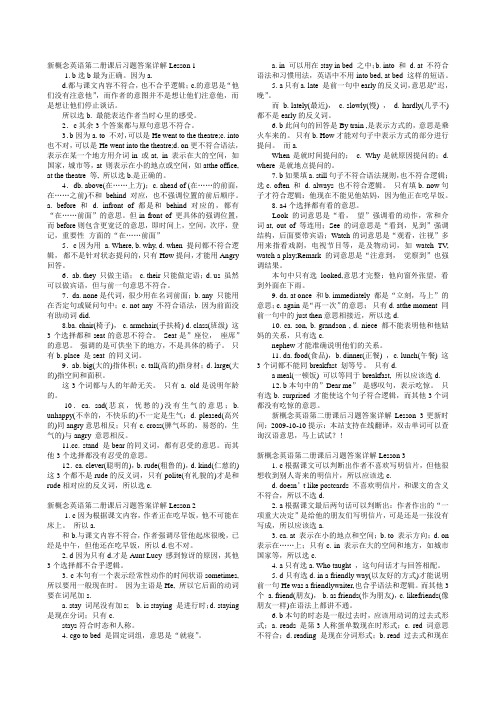
新概念英语第二册课后习题答案详解Lesson 11. b选b最为正确。
因为a.d.都与课文内容不符合,也不合乎逻辑;c.的意思是“他们没有注意他”,而作者的意图并不是想让他们注意他,而是想让他们停止谈话。
所以选b. 最能表达作者当时心里的感受。
2.c其余3个答案都与原句意思不符合。
3.b因为a. to 不对,可以是He went to the theatre;c. into 也不对,可以是He went into the theatre;d. on更不符合语法,表示在某一个地方用介词in 或at, in 表示在大的空间,如国家,城市等,at 则表示在小的地点或空间,如atthe office, at the theatre 等, 所以选b.是正确的。
4.db. above(在……上方);c. ahead of (在……的前面,在……之前)不和behind 对应,也不强调位置的前后顺序。
a. before 和 d. infront of 都是和behind对应的,都有“在……前面”的意思。
但in front of 更具体的强调位置,而before则包含更宽泛的意思,即时间上,空间,次序,登记,重要性方面的“在……前面”5.c因为用 a. Where, b. why, d. when 提问都不符合逻辑,都不是针对状态提问的,只有How提问,才能用Angry 回答。
6.ab. they 只做主语;c. their只能做定语;d. us 虽然可以做宾语,但与前一句意思不符合。
7.da. none是代词,很少用在名词前面;b. any 只能用在否定句或疑问句中;c. not any 不符合语法,因为前面没有助动词did.8.ba. chair(椅子),c. armchair(手扶椅) d. class(班级) 这3个选择都和seat的意思不符合。
Seat是”座位,座席”的意思。
强调的是可供坐下的地方,不是具体的椅子。
新概念英语2教学参考答案
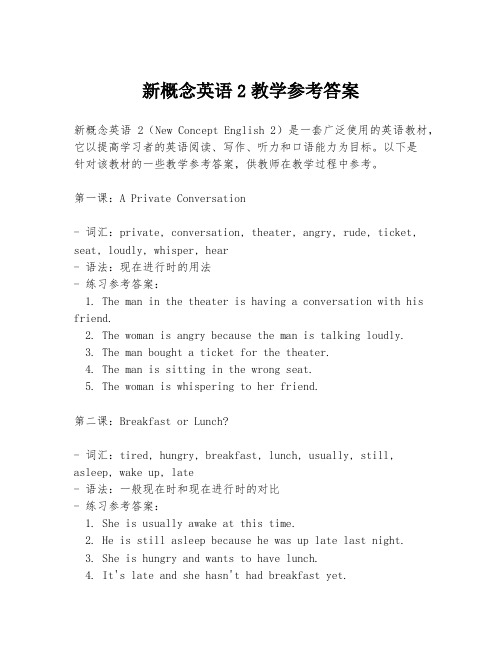
新概念英语2教学参考答案新概念英语2(New Concept English 2)是一套广泛使用的英语教材,它以提高学习者的英语阅读、写作、听力和口语能力为目标。
以下是针对该教材的一些教学参考答案,供教师在教学过程中参考。
第一课:A Private Conversation- 词汇:private, conversation, theater, angry, rude, ticket, seat, loudly, whisper, hear- 语法:现在进行时的用法- 练习参考答案:1. The man in the theater is having a conversation with his friend.2. The woman is angry because the man is talking loudly.3. The man bought a ticket for the theater.4. The man is sitting in the wrong seat.5. The woman is whispering to her friend.第二课:Breakfast or Lunch?- 词汇:tired, hungry, breakfast, lunch, usually, still, asleep, wake up, late- 语法:一般现在时和现在进行时的对比- 练习参考答案:1. She is usually awake at this time.2. He is still asleep because he was up late last night.3. She is hungry and wants to have lunch.4. It's late and she hasn't had breakfast yet.5. He usually has breakfast at 7:00 a.m.第三课:Please Send Me a Card- 词汇:postcard, holiday, museum, foreign, famous, send, receive, visit- 语法:祈使句的用法- 练习参考答案:1. Please send me a postcard from your holiday.2. I visited the museum while I was on holiday.3. She is sending a postcard to her friend.4. He received a postcard from a foreign country.5. The museum is famous for its art collection.第四课:An Exciting Trip- 词汇:exciting, trip, decide, leave, early, station, train, hurry, miss- 语法:一般将来时的用法- 练习参考答案:1. They are deciding to go on an exciting trip.2. The train leaves at 7:00 a.m., so they must hurry.3. She is going to miss the train if she doesn't hurry.4. He decided to leave early for the station.5. They are excited about their trip.第五课:No Wrong Numbers- 词汇:wrong, number, telephone, ring, speak, quickly, slowly, clearly- 语法:直接引语和间接引语- 练习参考答案:1. "This is the wrong number," she said.2. He asked her to speak more slowly.3. "Can you speak more clearly, please?" he asked.4. She rang the wrong number by mistake.5. He spoke so quickly that no one could understand him.第六课:Percy Buttons- 词汇:mystery, thief, catch, button, coat, pocket, return, steal- 语法:过去进行时的用法- 练习参考答案:1. The thief was stealing buttons from coats.2. The police were trying to catch the thief.3. Percy Buttons returned the stolen buttons.4. The buttons were in the thief's pocket.5. The mystery was solved when the thief was caught.第七课:Too Late- 词汇:late, ticket, concert, sell, hurry, queue, wait, miss - 语法:过去完成时的用法- 练习参考答案:1. The tickets had been sold out by the time he arrived.2. He hurried to the concert but was too late.3. She had been waiting in the queue for an hour.4. They missed the concert because they were late.5. He had intended to buy a ticket but it was too late.第八课:The Best and the Worst- 词汇:best, worst, player, team, win, lose, match, skill, improve- 语法:最高级形容词的用法- 练习参考答案:1. She is the best player on the team.2. The team won the match because of her skill.3. He is the worst player and needs to improve.4. The match was the best game of the season.5. They lost the match, making it the worst game.第九课:A Cold Welcome- 词汇:welcome, cold, weather, rain, snow, warm, coat, umbrella- 语法:形容词的比较级和最高级- 练习参考答案:1. The weather was the coldest she had ever experienced.2. He welcomed her with a warm smile.。
新概念英语(二)答案与解析
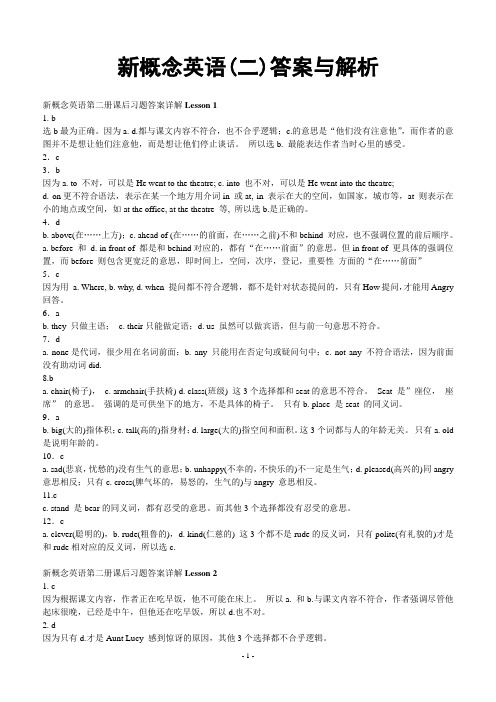
新概念英语(二)答案与解析新概念英语第二册课后习题答案详解Lesson 11. b选b最为正确。
因为a. d.都与课文内容不符合,也不合乎逻辑;c.的意思是“他们没有注意他”,而作者的意图并不是想让他们注意他,而是想让他们停止谈话。
所以选b. 最能表达作者当时心里的感受。
2.c3.b因为a. to 不对,可以是He went to the theatre; c. into 也不对,可以是He went into the theatre;d. on更不符合语法,表示在某一个地方用介词in 或at, in 表示在大的空间,如国家,城市等,at 则表示在小的地点或空间,如at the office, at the theatre 等, 所以选b.是正确的。
4.db. above(在……上方);c. ahead of (在……的前面,在……之前)不和behind 对应,也不强调位置的前后顺序。
a. before 和d. in front of 都是和behind对应的,都有“在……前面”的意思。
但in front of 更具体的强调位置,而before 则包含更宽泛的意思,即时间上,空间,次序,登记,重要性方面的“在……前面”5.c因为用 a. Where, b. why, d. when 提问都不符合逻辑,都不是针对状态提问的,只有How提问,才能用Angry 回答。
6.ab. they 只做主语;c. their只能做定语;d. us 虽然可以做宾语,但与前一句意思不符合。
7.da. none是代词,很少用在名词前面;b. any 只能用在否定句或疑问句中;c. not any 不符合语法,因为前面没有助动词did.8.ba. chair(椅子),c. armchair(手扶椅) d. class(班级) 这3个选择都和seat的意思不符合。
Seat 是”座位,座席”的意思。
强调的是可供坐下的地方,不是具体的椅子。
(完整版)新概念英语第二册课后习题答案详解
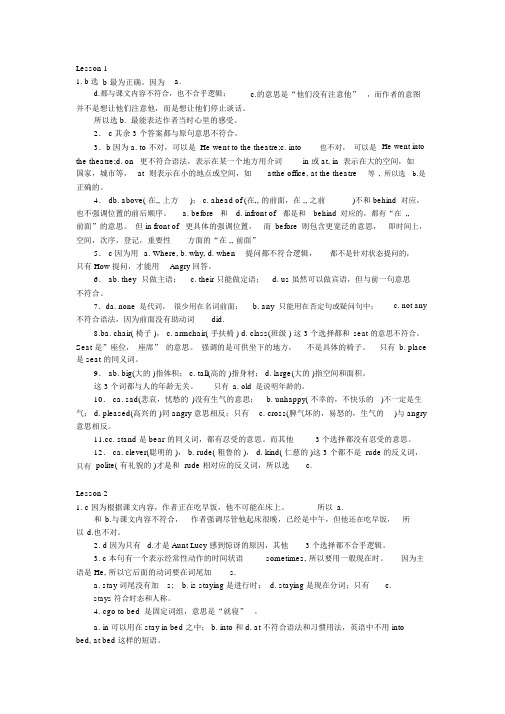
Lesson 11. b 选 b 最为正确。
因为 a.d.都与课文内容不符合,也不合乎逻辑; c.的意思是“他们没有注意他”,而作者的意图并不是想让他们注意他,而是想让他们停止谈话。
所以选 b. 最能表达作者当时心里的感受。
2. c 其余 3 个答案都与原句意思不符合。
3.b 因为 a. to 不对,可以是 He went to the theatre;c. into也不对,可以是He went into the theatre;d. on更不符合语法,表示在某一个地方用介词in 或 at, in 表示在大的空间,如国家,城市等,at 则表示在小的地点或空间,如atthe office, at the theatre等,所以选 b.是正确的。
4. db. above( 在,, 上方); c. ahead of (在,, 的前面,在 ,, 之前)不和 behind 对应,也不强调位置的前后顺序。
a. before和 d. infront of都是和behind对应的,都有“在,,前面”的意思。
但 in front of更具体的强调位置,而before则包含更宽泛的意思,即时间上,空间,次序,登记,重要性方面的“在 ,, 前面”5. c 因为用 a. Where, b. why, d. when提问都不符合逻辑,都不是针对状态提问的,只有 How 提问,才能用Angry 回答。
6. ab. they只做主语; c. their 只能做定语; d. us 虽然可以做宾语,但与前一句意思不符合。
7.da. none是代词,很少用在名词前面; b. any只能用在否定句或疑问句中; c. not any 不符合语法,因为前面没有助动词did.8.ba. chair( 椅子 ), c. armchair( 手扶椅 ) d. class(班级 ) 这 3 个选择都和seat 的意思不符合。
Seat 是”座位,座席” 的意思。
新概念英语第二册全册课后习题答案详解及单元测试答案【精编】

新概念英语第二册课后习题答案详解Lesson 11. b选b最为正确。
因为a.d.都与课文内容不符合,也不合乎逻辑;c.的意思是“他们没有注意他”,而作者的意图并不是想让他们注意他,而是想让他们停止谈话。
所以选b. 最能表达作者当时心里的感受。
2.c其余3个答案都与原句意思不符合。
3.b因为a. to 不对,可以是He went to the theatre;c. into 也不对,可以是He went into the theatre;d. on更不符合语法,表示在某一个地方用介词in 或at, in 表示在大的空间,如国家,城市等,at 则表示在小的地点或空间,如atthe office, at the theatre 等, 所以选b.是正确的。
4.db. above(在……上方);c. ahead of (在……的前面,在……之前)不和behind 对应,也不强调位置的前后顺序。
a. before 和d. infront of 都是和behind对应的,都有“在……前面”的意思。
但in front of 更具体的强调位置,而before则包含更宽泛的意思,即时间上,空间,次序,登记,重要性方面的“在……前面”5.c因为用a. Where, b. why, d. when 提问都不符合逻辑,都不是针对状态提问的,只有How提问,才能用Angry回答。
6.ab. they 只做主语;c. their只能做定语;d. us 虽然可以做宾语,但与前一句意思不符合。
7.da. none是代词,很少用在名词前面;b. any 只能用在否定句或疑问句中;c. not any 不符合语法,因为前面没有助动词did.8.ba. chair(椅子), c. armchair(手扶椅) d. class(班级) 这3个选择都和seat的意思不符合。
Seat是”座位,座席”的意思。
强调的是可供坐下的地方,不是具体的椅子。
- 1、下载文档前请自行甄别文档内容的完整性,平台不提供额外的编辑、内容补充、找答案等附加服务。
- 2、"仅部分预览"的文档,不可在线预览部分如存在完整性等问题,可反馈申请退款(可完整预览的文档不适用该条件!)。
- 3、如文档侵犯您的权益,请联系客服反馈,我们会尽快为您处理(人工客服工作时间:9:00-18:30)。
新概念英语第二册课后习题答案详解Lesson 11. b选b最为正确。
因为a. d.都与课文内容不符合,也不合乎逻辑;c.的意思是“他们没有注意他”,而作者的意图并不是想让他们注意他,而是想让他们停止谈话。
所以选b. 最能表达作者当时心里的感受。
2.c其余3个答案都与原句意思不符合。
3.b因为a. to 不对,可以是He went to the theatre;c. into 也不对,可以是He went into the theatre;d. on更不符合语法,表示在某一个地方用介词in 或at, in 表示在大的空间,如国家,城市等,at 则表示在小的地点或空间,如atthe office, at the theatre 等, 所以选b.是正确的。
4.db. above(在……上方);c. ahead of (在……的前面,在……之前)不和behind 对应,也不强调位置的前后顺序。
a. before 和 d. infront of 都是和behind对应的,都有“在……前面”的意思。
但in front of 更具体的强调位置,而before则包含更宽泛的意思,即时间上,空间,次序,登记,重要性方面的“在……前面” 5.c因为用 a. Where, b. why, d. when 提问都不符合逻辑,都不是针对状态提问的,只有How提问,才能用Angry回答。
6.ab. they 只做主语; c. their只能做定语;d. us 虽然可以做宾语,但与前一句意思不符合。
7.da. none是代词,很少用在名词前面;b. any 只能用在否定句或疑问句中;c. not any 不符合语法,因为前面没有助动词did. 8.ba. chair(椅子), c. armchair(手扶椅) d. class(班级) 这3个选择都和seat的意思不符合。
Seat是”座位,座席” 的意思。
强调的是可供坐下的地方,不是具体的椅子。
只有b. place 是seat 的同义词。
9.ab. big(大的)指体积;c. tall(高的)指身材;d. large(大的)指空间和面积。
这3个词都与人的年龄无关。
只有a. old是说明年龄的。
10.ca. sad(悲哀,忧愁的)没有生气的意思;b. unhappy(不幸的,不快乐的)不一定是生气;d. pleased(高兴的)同angry意思相反;只有c. cross(脾气坏的,易怒的,生气的)与angry 意思相反。
. stand 是bear的同义词,都有忍受的意思。
而其他3个选择都没有忍受的意思。
12.ca. clever(聪明的),b. rude(粗鲁的),d. kind(仁慈的)这3个都不是rude的反义词,只有polite(有礼貌的)才是和rude相对应的反义词,所以选c.新概念英语第二册课后习题答案详解Lesson 21. c因为根据课文内容,作者正在吃早饭,他不可能在床上。
所以a. 和b.与课文内容不符合,作者强调尽管他起床很晚,已经是中午,但他还在吃早饭,所以d.也不对。
2. d因为只有d.才是Aunt Lucy 感到惊讶的原因,其他3个选择都不合乎逻辑。
3. c本句有一个表示经常性动作的时间状语sometimes,所以要用一般现在时。
因为主语是He, 所以它后面的动词要在词尾加s.a. stay 词尾没有加s;b. is staying 是进行时;d. staying 是现在分词;只有c. stays符合时态和人称。
4. cgo to bed 是固定词组,意思是“就寝”。
a. in 可以用在stay in bed 之中;b. into 和 d. at 不符合语法和习惯用法,英语中不用into bed, at bed 这样的短语。
5. a只有a. late 是前一句中early的反义词,意思是“迟,晚”。
而 b. lately(最近), c. slowly(慢) , d. hardly(几乎不) 都不是early的反义词。
6. b此问句的回答是By train ,是表示方式的,意思是乘火车来的。
只有b. How才能对句子中表示方式的部分进行提问。
而a. When是就时间提问的;c. Why是就原因提问的;d. where 是就地点提问的。
7. b如果填a. still句子不符合语法规则,也不符合逻辑;选c. often 和d. always 也不符合逻辑。
只有填b. now句子才符合逻辑:他现在不能见他姑妈,因为他正在吃早饭。
8. a4个选择都有看的意思。
Look 的词意思是“看,望”强调看的动作,常和介词at, out of 等连用;See 的词意思是“看到,见到”强调结构,后面要带宾语;Watch的词意思是“观看,注视”多用来指看戏剧,电视节目等,是及物动词,如watch TV, watch a play;Remark 的词意思是“注意到,觉察到”也强调结果。
本句中只有选looked,意思才完整:他向窗外张望,看到外面在下雨。
9. da. at once 和b. immediately 都是“立刻,马上”的意思;c. again 是“再一次”的意思;只有d. atthe moment 同前一句中的just then意思相接近,所以选d. 10. ca. son, b. grandson , d. niece 都不能表明他和他姑妈的关系,只有选c. nephew才能准确说明他们的关系。
11. da. food(食品),b. dinner(正餐) ,c. lunch(午餐) 这3个词都不能同breakfast 划等号。
只有d. a meal(一顿饭) 可以等同于breakfast, 所以应该选d. 12. b本句中的”Dear me” 是感叹句,表示吃惊。
只有选b. surprised 才能使这个句子符合逻辑,而其他3个词都没有吃惊的意思。
新概念英语第二册课后习题答案详解Lesson 3更新时间:2009-10-10提示:本站支持在线翻译,双击单词可以查询汉语意思,马上试试?!新概念英语第二册课后习题答案详解Lesson 31. c根据课文可以判断出作者不喜欢写明信片,但他很想收到别人寄来的明信片,所以应该选c. d. doesn’t like postcards 不喜欢明信片,和课文的含义不符合,所以不选d.2. a根据课文最后两句话可以判断出:作者作出的“一项重大决定”是给他的朋友们写明信片,可是还是一张没有写成,所以应该选a.3. ca. at 表示在小的地点和空间;b. to 表示方向;d. on 表示在……上;只有c. in 表示在大的空间和地方,如城市国家等,所以选c. 4. a只有选a. Who taught ,这句问话才与回答相配。
5. d只有选d. in a friendly way(以友好的方式)才能说明前一句He wasa friendlywaiter,也合乎语法和逻辑。
而其他3个 a. friend(朋友), b. as friends(作为朋友),c. likefriends(像朋友一样)在语法上都讲不通。
6. b本句的时态是一般过去时,应该用动词的过去式形式;a. reads 是第3人称蛋单数现在时形式;c. red 词意思不符合;d. reading 是现在分词形式;b. read 过去式和现在式形式相同,发音不同。
所以只有选b. 7. ca. the hole 词意思不对;b. the ball 和 d. all of 不合乎习惯用法;英语中不用the all day, all of day这样一来的短语。
只有选c. all 才能使句中的词组all day 同前一句中的the whole day 意思相同。
8. c句中的waiter 是“饭店服务员”的意思,他通常在饭店工作,而不在a. public garden(公园),b. shop(商店),d. private house(私宅) 工作,所以选c. restaurant. 9. b只有b. borrowed 才与前一句中的lent相对应,而其他3个选择都不是。
英语中的borrow 和lend都有“借”的意思,但是borrow是“向……借”,而lend则是借给。
10. ab. end(最后,结束)有名词和动词词性,不能用在名词前修饰名词。
c. latest (最近的)不符合意思。
d. bottom(底部)是名词,不能修饰名词只有a. final(最后的)才能使句子的意思成立。
11. b只有b. made up his mind(下决心)才同前一句中的made a big decision 意思相近。
而其他3个选择a. thought about it (考虑),c. changed his mind(改变主意),d. made awish(立下心愿)都没有下决心的意思。
12. b只有b. didn’t write even one(连一张也没有写)与前一句中的didn’t write a single card意思相同,而a. wrote only one, c. wrote just one, d. wrote all the cardsexcept one 都与其意思有别。
新概念英语第二册课后习题答案详解Lesson 41. d根据课文内容Tim is an engineer. He is working for a big firm..., 只有d. Timis working for a big firm as an engineer 是对的,其他3个与文章不符合。
2. b根据课文的最后一句My brother has never been abroadbefore…,应该选b.其他3个选择都与课文内容不符合。
3. ab. in(在……里面)不能和动词go连用;c. at(在……地方)也不能同go 连用;d. into(进入……内)可以与go连用,但是到某个国家不能用go into;只有a. to 同动词go 连用go to才能表示到某个地方去,如国家,城市等,所以选a. 4. b本句是问“他在那儿呆了多久”。
因为说话时他还在那,所以应该用现在完成时态。
a. is he 是一般现在时;c. has he 中没有过去分词been, 不符合语法;d. was he 是一般过去时;只有b. has he been 是现在完成时, 所以选b. 5. ba. for 只有同表示一段时间的词连用时候才能用在完成时中,如for six months, for one year等.c. from 常与介词to连用表示"从……到……",它很少用于现在完成时;d. by 可以表示时间“到……为止”,常用于过去完成时中和将来完成时中,但是它用在本句意思不对;只有b. since(从……以来)可以用在完成时态中,选b.才能使句子的时态和意思正确并且合乎逻辑。
